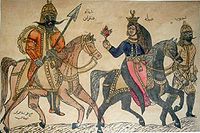- Antarah ibn Shaddad
-
'Antarah Ibn Shaddād al-'Absī عنترة بن شداد العبسي was a pre-Islamic Arabian Najdi hero and poet (525-608) famous both for his poetry and his adventurous life. What many consider his best or chief poem is contained in the Mu'allaqat. The account of his life forms the basis of a long and extravagant romance.
Contents
Biography
Antarah was born in Najd (the northern Arabian Peninsula) , He was the son of Shaddād, a well-respected member of the Arabian tribe of Banu Abs, his mother was named Zabibah, an Ethiopian woman, whom Shaddad had enslaved after a tribal war. The tribe neglected Antara at first, and he grew up in servitude. Although it was fairly obvious that Shaddad was his father. He was considered one of the "Arab crows" (Al-aghribah Al-'Arab) because of his jet black complexion. Antara gained attention and respect for himself by his remarkable personal qualities and courage in battle, excelling as an accomplished poet and a mighty warrior. When the tribe needed his assistance to fend off another tribe in battle, Shaddād acknowledged Antara as his son, and granted him freedom.
Antarah fell in love with his cousin Abla, and sought to marry her despite his status as a slave. To secure allowance to marry, Antarah had to face challenges including getting a special kind of camel from the northern Arabian kingdom of al-No'man Ibn al-Munthir Ibn Ma' al-Sama'.
Antarah took part in the great war between the related tribes of Abs and Dhubyān, which began over a contest of horses and was named after them the war of Dāhis and Ghabrā. He died in a fight against the tribe of Tai.
Antarah's poetry is well preserved, and often talks of chivalrous values, courage and heroism in battle, as well as his love for Abla. It was immortalized when one of his poems was included in the Hanged Poems. The poetry's historical and cultural importance stems from its detailed descriptions of battles, armour, weapons, horses, desert and other themes from his time.
The Russian composer Nikolai Rimsky-Korsakov wrote his Symphony No. 2 based on the legend of Antar.
One of the seven clans (tribes) of Bethlehem is called the Anatreh, named after Antarah, and in past centuries acted as guardians of the church of the nativity.
Literature
In 1898 the French painter Étienne Dinet published[1] his translation of a 13th century epic Arab poem Antar which brought Antar bin Shaddad to European notice.[1] It has been followed by a number of derivative works such as Diana Richmond's Antar and Abla[2] which furthered western exposure to the Antar bin Shaddad legends.
See also
- Arabic literature
- Arabic romance literature
- Banu Abs
- Thornycroft Antar - British pipeline tractor named after his strength and endurance
References
Antara's poems are published in Wilhelm Ahlwardt's The Diwans of the six ancient Arabic Poets (London, 1870); they have also been published separately at Beirût (1888). As regards their genuineness, cf. W. Ahlwardt's Bemerkungen uber die Aechtheit der alten arabichen Gedichte (Greifswald, 1872), pp. 50ff. The Romance of 'Antar (Sîrat 'Antar ibn Shaddâd) is a work which was long handed down by oral tradition only, has grown to immense proportions and has been published in 32 vols. at Cairo, 1307 (A.D. 1889), and in 10 vols. at Beirût, 1871. It was partly translated by Terrick Hamilton under the title 'Antar, a Bedoueen Romance (4 vols., London, 1820).
- ^ a b Pouillon, Francois (1997) Les deux vies d'Étienne Dinet, peintre en Islam: L'Algerie et l'heritage colonial Editions Balland, Paris;
- ^ Richmond, Diana (1978) Antar and Abla: a Bedouin romance Quartet Books, London, ISBN 0704321629 ;
External links
- English translation of Antara's Hanged Poem
- another link to the same
- The Hanged Poem of Antara (Arabic)
- The Hanged Poem of Antara "another version" (Arabic)
- Antara the Lion: Father of Heroes
 This article incorporates text from a publication now in the public domain: Chisholm, Hugh, ed (1911). Encyclopædia Britannica (11th ed.). Cambridge University Press.Categories:
This article incorporates text from a publication now in the public domain: Chisholm, Hugh, ed (1911). Encyclopædia Britannica (11th ed.). Cambridge University Press.Categories:- 6th-century poets
- Pre-Islamic era poets
Wikimedia Foundation. 2010.

